|
|
|
Sort Order |
|
|
|
Items / Page
|
|
|
|
|
|
|
| Srl | Item |
| 1 |
ID:
131415
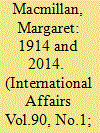

|
|
|
|
|
| Publication |
2014.
|
| Summary/Abstract |
The outbreak of the First World War remains a great historical puzzle and a source of concern, for if we do not understand how it came about we run the risk of stumbling into a similar catastrophe. This article draws parallels between the world of 1914 and the present. It starts with comfortable assumptions made by so many, then and now, that a major conflict was impossible or improbable and then looks at the paradox that globalization not only made the world more interdependent and linked, but also fostered intense local and national identities. It suggests factors that propelled Europe to war in 1914, including national rivalries, imperialism, the arms race and a shifting power balance between rising and declining powers, as well as ideologies and assumptions such as Social Darwinism and militarism, and points out that similar forces and ideas are present today. The article also stresses the dangerous complacency that can arise as a result of decision-makers having successfully dealt with a series of crises. European decision-makers also assumed that they could successfully use war as an instrument of policy and largely ignored or explained away the mounting evidence that the advantage in conflict was swinging to the defence. Again, as the author points out, there are disquieting parallels with the present.
|
|
|
|
|
|
|
|
|
|
|
|
|
|
|
|
| 2 |
ID:
139769
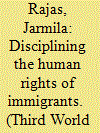

|
|
|
|
|
| Summary/Abstract |
This paper investigates the technologies of controlling migration and how the human rights of third-country nationals are disciplined and limited in many European Union member states. It discusses the rationalities of allowing entry as they are inscribed in the Schengen visa regulations and in the regulations relating to resident permits and family reunification rights in various European countries. Specifically the paper sheds light on how market veridiction results in the disciplining of human rights in these policies. The analysis is conducted through a Foucauldian governmentality framework entailing an analysis of the problematisations of immigration through market veridiction and how these are applied today to limit immigrants’ human rights. The paper then compares these rationalities to eugenic justifications for problematising immigration in the USA from 1860s onwards. This historical comparison shows how social Darwinist notions of human worth continue to function at the level of rationalities and technologies of disciplining immigrants’ human rights. The paper concludes that market veridiction makes human rights function inside a framework of (e)quality in which human worth is calculated as ‘quality’ and not as ‘equality’, and shows how migrants’ human rights are made to function as something to be earned rather than something inherent or inalienable.
|
|
|
|
|
|
|
|
|
|
|
|
|
|
|
|
| 3 |
ID:
146634
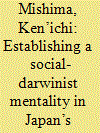

|
|
|
|
|
| Summary/Abstract |
From a historical perspective, the welfare net in Japan was established from above without democratic participation and expanded only slowly. This expansion in many cases was aimed at enhancing national cohesion, especially during war time. During the current neoliberal era, Japan’s paternalistic welfare state has been able to put into practice the dismantling of national pension and health-care systems without the need for any theoretical re-orientation. In response, counter-publics have engaged in protest and resistance. By doing so, the victims of modernization and those who are socially weak and disadvantaged in multiple ways are able to regain their self-esteem and personal integrity.
|
|
|
|
|
|
|
|
|
|
|
|
|
|
|
|
| 4 |
ID:
142836
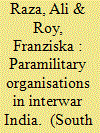

|
|
|
|
|
| Summary/Abstract |
This paper examines the emergence of paramilitary and volunteer movements in interwar British India. These organisations emerged largely in response to the political climate in India as well as developments elsewhere around the globe. The most notable amongst these was the emergence of fascism in Europe. We examine the politics and ideas of these organisations through two case studies: the Hindustani Seva Dal and the Khaksar Tehreek. Notwithstanding the many differences between the two, both groups were profoundly influenced by a broader fascist moment. In doing so, they embodied certain aspirations and anxieties that were characteristic of the interwar era. Through these case studies, then, we hope to provide some insights into a frequently overlooked aspect of the interwar period in British India.
|
|
|
|
|
|
|
|
|
|
|
|
|
|
|
|
| 5 |
ID:
146633
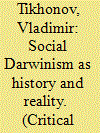

|
|
|
|
|
| Summary/Abstract |
By the time of Korea’s forced integration into the Japanese Empire in 1910, Social Darwinism was established as the main reference frame for the modernizing intellectual elite. The weak had only themselves to blame for their misfortune, and Korea, if it wished to succeed in collective survival in the modern world’s Darwinist jungles, had to strengthen itself. This mode of thinking was inherited by the right-wing nationalists in the 1920s–1930s; their programs of “national reconstruction” (minjok kaejo) aimed at remaking weak Korea into a “fitter” nation, thus preparing for the eventual independence from the Japanese. At the same time, in the 1920s and 1930s some nationalists appropriated the slogan of solidarity and protection of the weak, nationally and internationally, in the course of their competition against the Left. After liberation from Japanese colonialism in 1945, “competition” mostly referred to inter-state competition in South Korean right-wing discourse. However, the neo-liberal age after the 1997 Asian financial crisis witnessed a new discursive shift, competition-driven society being now the core of the mainstream agenda.
|
|
|
|
|
|
|
|
|
|
|
|
|
|
|
|
|
|
|
|
|